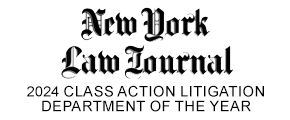Championing Justice for Tech Workers, Innovators, and Entrepreneurs
Issue: Remedying violations of employment, IP, and antitrust law.
The pursuit of justice is what motivates the lawyers at Lieff Cabraser. We take cases that make a difference — to an individual, a family, a company, or an entire industry. Many of our clients are tech workers and startup companies. With our headquarters in San Francisco and another office in New York City, both centers of today’s innovation economy, we are well-situated to thoroughly investigate and efficiently bring these cases.
We typically represent tech workers in cases involving:
- Gender or race discrimination;
- Wage & hour violations, including improper denial of overtime pay;
- Stock option disputes;
- Breach of contract;
- Conspiracies to suppress salaries or worker mobility; and
- Whistleblower issues, where our clients have uncovered large-scale billing fraud.
We also represent inventors, startups, and small companies. We prevent our clients from being pushed out of the marketplace by dominant companies that conspire to restrain trade, monopolize markets, or steal intellectual property.
Achieving Justice for Tech Employees
Stopping Gender Discrimination in the Workplace
 It has been described as a “dark secret” in the tech industry: pervasive sexism resulting in gender discrimination in the hiring, promotion, and compensation of female programmers, engineers, software designers, and other tech positions.
It has been described as a “dark secret” in the tech industry: pervasive sexism resulting in gender discrimination in the hiring, promotion, and compensation of female programmers, engineers, software designers, and other tech positions.
At many tech companies, only a tiny fraction of these employees – 2% to 4% in some cases – are women.
In an article on sexism in Silicon Valley, the Los Angeles Times noted, “It’s no secret that the tech industry has a shortage of women. What’s less well known is that the industry famous for its bravado about changing the world still lags decades behind other industries in its treatment of women, many of whom say they routinely confront sexism in the companies where they work and at the technology conferences they attend.”
As noted by Kelly M. Dermody, the chair of Lieff Cabraser’s employment practice group, “Despite the tremendous success of a few women in tech, the sad truth is that it is an industry plagued by gender stereotyping and bias. It may be a relatively new and undeniably innovative sector, but it has remained remarkably traditional in terms of maintaining an old-style gender glass ceiling and in underpaying women.”
We have obtained significant settlements for tens of thousands of female employees in a wide-variety of industries, from retail sales to financial services. These settlements have also required the companies to provide greater employment and advancement opportunities going forward. We are actively reviewing complaints from female tech employees who were denied promotions or fired allegedly on the basis of their gender after taking initiative at their companies and seeking promotions and leadership positions.
Obtaining Overtime Pay Illegally Denied
 Companies misclassifying workers to avoid paying overtime is a serious, ongoing issue in the tech industry. The federal Fair Labor Standards Act and various state laws provide that all employees should get overtime unless they fall within certain narrow exemptions.
Companies misclassifying workers to avoid paying overtime is a serious, ongoing issue in the tech industry. The federal Fair Labor Standards Act and various state laws provide that all employees should get overtime unless they fall within certain narrow exemptions.
Job titles do not determine entitlement to overtime pay. Workers may be eligible for overtime pay even though they are salaried, highly-paid employees.
We have successfully represented IT and tech workers across America in class action lawsuits to obtain wrongfully denied overtime pay. Our settlements in overtime pay cases have exceeded $100 million, and the list of defendants includes IBM, Cadence, Computer Sciences Corporation, and AT&T.
Safeguarding Employee Stock Option and Contract Rights
In the high-tech industry, many employees are eligible to receive stock options.
 However, many stock option agreements include vague language that may provide a pretext for later denying those employees the stock they were promised. As a startup matures and inches closer to going public, the startup may look for ways to improperly prop up stock value by denying requests to approve stock transactions. We have successfully represented employees whose company wrongfully refused to allow the sale of vested stock.
However, many stock option agreements include vague language that may provide a pretext for later denying those employees the stock they were promised. As a startup matures and inches closer to going public, the startup may look for ways to improperly prop up stock value by denying requests to approve stock transactions. We have successfully represented employees whose company wrongfully refused to allow the sale of vested stock.
Our representation of employees in contractual disputes also includes serving as counsel for a class of 12,000 tech workers brought to the U.S. by the Indian conglomerate Tata to work at U.S. corporations. The workers charged that Tata required them to sign over their tax refund checks and did not pay them what they were promised in their contracts. In 2013, we obtained a $29.75 million recovery for the Tata workers.
Ensuring Tech Workers Receive the Benefits of Competition
Fair and vigorous competition for talent among tech companies leads to employees receiving better salaries, greater compensation packages, and enhanced career opportunities. We prosecuted a landmark class action lawsuit against Apple, Adobe, Google, and other Silicon Valley tech giants for allegedly conspiring to suppress the pay of technical, creative, and other salaried employees, including by agreeing not to actively recruit each other’s employees.
In 2015, the Court approved a $415 million settlement, bringing the total settlements in the case to $430 million, which constitutes the largest resolution ever of antitrust claims in the employment setting, on either an aggregate or per-class-member basis.
Assisting Employees Blow the Whistle on Corporate Fraud
Tech companies that knowingly defraud an agency of the federal government are subject to substantial liability under the False Claims Act. In addition, many states and major cities have their own whistleblower laws to expose fraud or wrongdoing.
Almost any type of fraud in which the government has paid money, or paid more than it should have, based on fraudulent claims, can qualify as a whistleblower case. An employee with evidence of such fraud can serve as a whistleblower and share in the recovery the government receives if the lawsuit is successful.
For example, we represented an employee in a case that resulted in a $37 million settlement against a defense contractor that manufactured flares designed for nighttime combat, covert missions, and search and rescue operations. A key design specification set by the Defense Department was that the flares ignite only under certain conditions, and specifically not when dropped from a height of less than 10 feet. According to the defendant’s own internal analysis, the complaint alleged, the flares at issue ignited when dropped from a height of as little as one foot.
In addition to fraud involving federal government contracts and programs, other statutes reward and protect whistleblowers who bring corporate tax fraud and securities laws violations to the government’s attention.
Promoting Fair Competition for Startups to Succeed
The power of dominant corporations to fix prices, restrict supply, and stifle innovation gave rise to the nation’s first antitrust laws more than a century ago. Today, Lieff Cabraser is at the forefront of innovative and landmark cases promoting fair competition and protecting valuable intellectual property.
We assist business owners and start-up companies harmed by anticompetitive conduct assess market circumstances and determine whether and how to pursue legal action to achieve their goals. Our advice springs from a sophisticated understanding of the legal, economic, and business issues related to antitrust, intellectual property, and commercial litigation.
Our fee model is aligned with the interests of our clients. We work with our clients to develop a contingent fee agreement or negotiate a blend of contingent and hourly fees and costs. This enables clients with limited financial resources to litigate their claims and hold accountable powerful corporations possessing seemingly unlimited resources. The list of companies our clients have successfully brought suit against includes Microsoft, Toshiba, Monsanto, Sharp, Samsung, and LG.
Protecting the Rights of Innovators and Creators
We represent inventors, startups, and small businesses in intellectual property disputes against some of the world’s largest technology companies. Our IP lawyers handle all phases of patent, copyright, and trademark infringement matters, from pre-litigation licensing strategy, filing and prosecution of lawsuits, to defending judgments on appeal before the United States Courts of Appeals for the Federal Circuit.
Contact us
Workers, innovators, and entrepreneurs in the technology industry are welcome to contact Lieff Cabraser for further information on your legal rights. We will review your claim for free, confidentially, and without any obligation on your part. Or you may call us toll-free at 1 (800) 541-7358 and ask to speak to Lieff Cabraser attorneys Dean M. Harvey or Anne B. Shaver.













